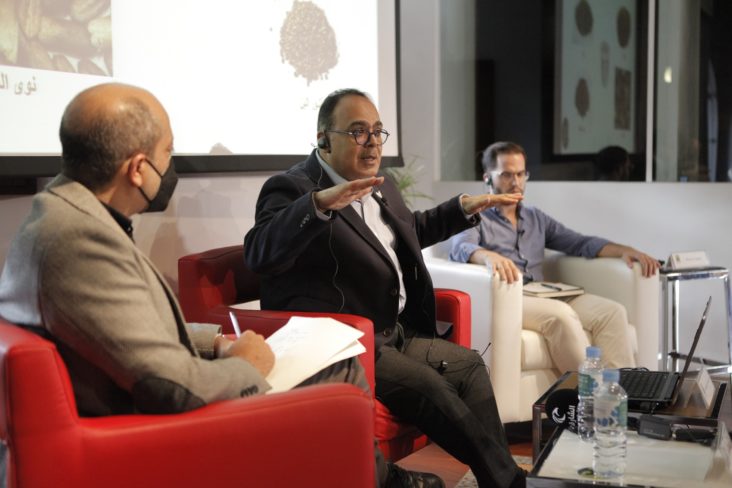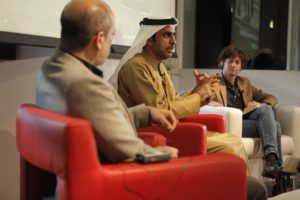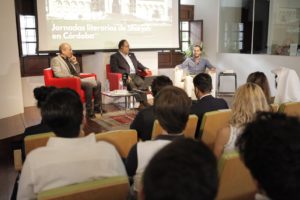Emirati And Spanish Literati Highlight The Role Of Coffee And Water Instrengthening Cultural Ties Between Arabs And Spaniards

The significance of coffee in Spain’s bilateral relations with the Arab world and the symbolism of water in Arab and Spanish poetry was under the spotlight at the ‘Sharjah Literary Days’ event in Madrid and Cordoba, organised by the Sharjah Book Authority (SBA) in cooperation with Cása Árabe, a strategic centre that facilitates Spain’s relations with the Arab world.
Elite Emirati and Spanish intellectuals and academics took part in sessions and seminars held as part of the event in the presence of HE Ahmed bin Rakkad Al Ameri, SBA Chairman.
The role of coffee as a cultural ambassador
In a session titled ‘The Journey of Arabic Coffee’, HE Dr. Abdul Aziz Al Musallam, Chairman of the Sharjah Institute for Heritage, said coffee is a staple in Arab Majlis’ (councils) and a symbol of generosity in the Arab world. The importance given to the beverage in Arab culture can be gauged by the fact that the coffee brewer is given the status of a professional, known as ‘Al Qahwaji’. Speakers in the session included Alfonso Copado, a Barista advisor at Cafentos and Encarna Gutiérrez, Secretary General of the Islamic Culture Foundation (FUNCI).
The influence of coffee on Arab culture is indelible. In UAE for instance, the ‘dallah’ (Arabic for coffee pot) is seen on the back of the one-dirham coin.
Al Musallam said: “The dirham coin has the Qurayshia brass coffee pot on it, which can be adorned with accessories like women’s earrings.” He added that a pottery in Wadi Haqil in Ras Al Khaimah was the first to produce the ‘dallah’ in the UAE.”
Elaborating on the types of coffee pots used in the UAE, Al Musallam said that there were three distinct varieties – a large one called Al Khamra, and Al Mazala and Al Taljima, which are used to make coffee with saffron, cardamom, rose water, and cloves. Some tribes make a concoction called Oud coffee by adding agarwood to the mixture.
The UAE is famous for ‘Finjan Al Masboo’, a specialist coffee that includes rose water, saffron, cloves, cardamom and nutmeg, he said. It had been late Sheikh Zayed bin Sultan Al Nahyan, the founding father of the UAE’s favourite brew.
Al Musallam shared some interesting traditions associated with the coffee serving ritual. For instance, a guest was expected to drink at least three cups of coffee before declining any more.
For his part, Encarna Gutiérrez said coffee has served as a bridge for cultural exchange between the Arab world and Spain. He said that Abyssinia (Ethiopia) was considered the birthplace of coffee, from where it spread to Yemen and across the GCC region. The sixteenth century saw the bean taking hold of the Middle East, North Africa, and Europe, leading to an increase in trade between the Arab world and Europe.
Gutiérrez said this had led to cultural, and religious relations between countries. Over time, coffee came to symbolise socialising and communication, especially in the Arab region, where the phrase ‘Let’s have a cup of coffee’ is a reference to meeting and discussion.
Alfonso Copado said he admired the coffee culture in Arab countries, particularly in the Gulf region. “Coffee is one of the most important hospitality symbols in Arab culture. There are traditional ceremonies connected to its preparation as well as consumption, unlike Europe and the Iberian peninsula” he added.
He discussed the differences in coffee drinking culture between Arabs and Europeans, pointing out that the Spanish and Europeans in general tend to drink coffee quickly, while in Arab countries it is consumed at leisure given its status as a drink that ‘grants happiness’.
He spoke about the key differences between Arabic and European coffee, pointing out that Arabic coffee being blended with saffron, and cardamom has a very special flavour.
The symbolism of water in Arabic and Andalusian poetry
During a session titled Water in Arabic and Andalusian Poetry, author and poet Awad Khalifa Al Darmaki; José Miguel Puerta, an Arabist and Professor of Art History at the University of Granada; and Juan Antonio Bernier is a poet, translator, teacher and cultural manager, discussed the influences of the natural element presence of water and its symbolism that has appeared in both Arabic and Andalusian literature through the centuries.
Puertanoted that with the emergence of Islam in Andalusia, symbolic references to water began appearing in abundance in poetry, literature and Andalusia’s Sufi texts connected to Islamic culture, offering the example of the Umayyad period’s palace architecture adorned with designs of fountains and ponds, and with poetic verses that describe the beauty of water.
Water has been used as a poetic tool in Andalusian literature, the speaker emphasised adding that it signified heaven and was revered as precious as silver; used as a symbol of both praise and lamentation. The professor also credited Arab and Islamic cultures for mainstreaming traditional public baths, noting that it was limited to the wealthy prior to the introduction of Islam in Andalusia.
For his part, Bernier cited poetic texts from both cultures as key examples of ways in which water has served as a bridge, connecting the past and the present literary form.
Comparing two Andalusian poets – one from a 1,000 years ago and a contemporary poet from Cordoba – Bernier noted similar terms the two poets employed in their poetry to describe the Andalusian capital’s natural beauty found in its rivers, lakes, fountains and gardens, highlighting the importance of water in influencing poetry though the ages.
Poets have always been revered in the Arab culture, said Al Darmaki, noting that the emergence of a poet in tribes was a cause of a celebration as poets would preserve their tribe’s legacy by reciting its glories. He added that Arabs,known for their architectural excellence, took their love of poetry to Andalusia on walls adorned with verses, and that Arab architectural monuments and squares have received high praise in Andalusian poetry.
He stressed that water in its many forms was used frequently by Arabic poets, including a poem by Andalusian poet and historian Lisan Al Din Ibn Al Khatib, whose work is found on the wall of the Court of the Myrtles, part of the palace and fortress complex of the Alhambra.
Speaking on Sharjah Literary Days, HE Ahmed bin Rakkad Al Ameri, SBA Chairman, said: “The impact of building cultural bridges and strengthening partnerships between Arabs and the rest of the world, under the directives of His Highness Sheikh Dr. Sultan bin Muhammad Al Qasimi, Supreme Council Member and Ruler of Sharjah, is evident today. During Sharjah Literary Days we have experienced the similarities between the Arab and Spanish cultures, cherished each one’s uniqueness, and identified mutual values, which can serve as a foundation to further expand Sharjah’s cultural project.”
“We believe that nations advance when they learn about and embrace the cultures of other countries, while staying true to their authentic identities. The vibrant and packed intellectual discussions we witnessed during Sharjah Literary Days reflects the historic impact Arab culture has had on Europe. The success of the event further emboldens our vision to open productive and effective channels of communication with global cultures.”



